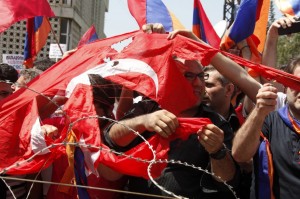 The political, economic and cultural changes experienced by Turkey and many neighboring countries over more than a century opened the door to nationalism, ethnicity problems and renewal processes tied to the building of nation-states.
The political, economic and cultural changes experienced by Turkey and many neighboring countries over more than a century opened the door to nationalism, ethnicity problems and renewal processes tied to the building of nation-states.And while this period brought with it warfare and clashes, it also made it easier for the various peoples of the Ottoman Empire, Russia and Iran — caught up in this stage of struggle — to break away from one another. And so now it is vital that these same peoples — who at one time exhibited the most compelling aspects of a culture of coexistence — come together once again around the table in the search for shared solutions, as one way to make up for the destruction of the past century.
In this light, the conference hosted from June 5-8 by Tbilisi State University was so important. Titled “The Caucasus at Imperial Twilight,” the conference gave speakers from Turkey, Azerbaijan, Armenia and Georgia (and some other countries as well) a chance to discuss and debate shared problems and possible solutions. Organized by Professor Hakan Yavuz from the University of Utah and the American Turkish Coalition, the conference’s location—Tbilisi, Georgia—was especially significant given that city’s important role as a center for mediation in regional disputes. While way back in 1918, the talks between the Müsavatçıs, Mensheviks and the Tashnaks took place in Tbilisi, this time the attempt to foster dialogue in a bid to see Azerbaijan, Armenia and Georgia improve their region is surely something that only Turkey could have taken on.
The conference had a broad historical scope, ranging from Turkey’s Tanzimat to the republic. It also touched on the various periods of awakening, constitutional work and political trends, and their effects on the region between and during these milestones. There was also a focus on changes throughout the Caucasus during these years, and particular attention was paid to how various groups culturally influenced one another in the region. Movements sparked by Caucasus intellectuals in Turkey were also examined at the conference. Debates over the tragedies that occurred as empires departed the stage of history, and what these tragedies meant for the world, were very fruitful for everyone at the conference. In the end, the conference provided a platform for various actors who all share the same region and overlapping problems to meet in the middle with their own suggestions for solutions. The participation of intellectuals like Garabet K. Moumdjian and Ara Papian—both open to compromise—helped make this meeting ideal.
Discussions on the Armenian issue and the arguments surrounding it all took place in a very democratic atmosphere. There was listening as well as criticism. The wide range of participants — including of course Turks, Georgians, Armenians and Azerbaijanis — included some who used the word “genocide” and others who chose not to, but the main point was that all sides listened to one another respectfully. In the wake of the conference, however, some Internet sites and publications like The Armenian Weekly and Asbarez — which have made a habit of targeting Turkey for criticism — have published articles and commentary accusing Armenians present at the conference of treason.
Such negative press, hindering compromise when it comes, is very influential. The new generation of Armenians — many of whom are multi-lingual — are often accused of having been “bought off.” Their attendance at conferences where people look to boost dialogue is always described in extremely negative terms in various publications. The Armenian Weekly, which has called on Armenian authorities to move against Turkey’s attempts to make peace, was successful in putting a high level of pressure on Armenians who were planning to attend the conference by publishing the names of prospective speakers on the program — which prevented them from coming to Tbilisi. This technique to block peace by setting Armenians against one another was used a century ago, with disastrous effects for all Armenians. In any case, this time around many prudent Armenians decided to ignore the propaganda and reacted negatively to attempts to stop people from expressing themselves at conferences. It now looks like Yerevan will have to leave behind these despotic stances as well as its critical approach to Turkey, and instead behave more reasonably.
And so a number of seemingly unbreakable taboos continue to hang over the heads of Armenians like the sword of Damocles. While a conference that allowed participants to speak freely about their own ideas — and where people’s viewpoints were listened to with respect and without belittlement — ought to have received support and applause, it instead inspired baseless accusations and negative propaganda from some circles. Publications that are extremely influential in the Armenian diaspora present these admirable efforts by Turkey as part of a larger “game.” These publications are doing everything they can to block the way forward, even putting heavy pressure on Armenians who want to participate in these programs. In this way, many intellectuals are prevented from joining in the general process of compromise and solution-finding. In the meantime, it is clear that more should be done in the face of these efforts to leave Turkey without any interlocutors on this issue. Also, there must be renewed efforts to support and increase the number of these conferences and programs, which are so critical for the peace-building.
In the end, this unique conference was supported and applauded by all the participants, not to mention the country that hosted it. There is already demand for more conferences of this kind in the future, as it is only with these sorts of reasonable steps that hostilities will come to an end and cooperation can be built.
Mehmet Fatih ÖZTARSU

 Haziran 23rd, 2013
Haziran 23rd, 2013  oztarsu
oztarsu  Posted in
Posted in